God is never pleased with ignorant worship, with worship that is not grounded in the knowledge of God. Worship must be grounded in the knowledge of God.
R.C Sproul
Writing a piece on Trinity is not a trivial task: The Church has spent the past two millennia refining the doctrine since it was concretely revealed in the incarnation of Jesus Christ. For the past few years, I've spent quite a bit of time reading up on the apologetics and theology of Cornelius Van Til. For Van Til, the Trinity is not some concept that we merely deduce from Scripture that has no bearing on our lives (other than it being something we know about God.) For Van Til, the Trinitarian God is the precondition for intelligible experience and only the Trinitarian God can be the precondition for the intelligible experience [1].
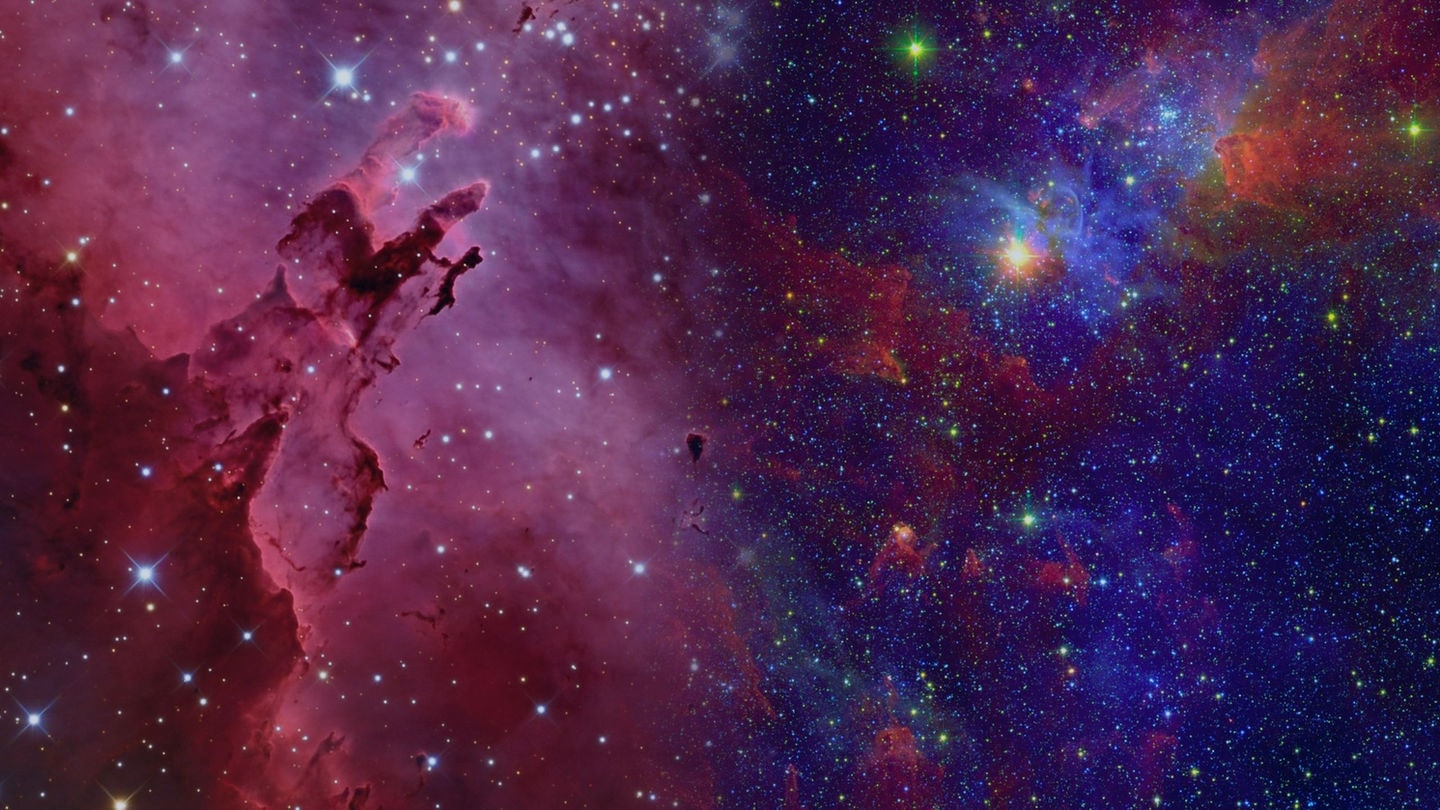
Naturally, this requires us to at least have an idea about who (not what) the Trinitarian God is. It is not usually the case that apologists would bring something like the Trinty to the forefront of their apologetic. It's usually something introduced to an unbeliever after they've somewhat been convinced of an "unmoved mover" or something because apologists tend to fear that unbelievers would regard the Trinity as absurd and hence that it would drive them away.
Enter Van Til. Van Til claims that if there's no submission to the Triune God of Scripture from the beginning of the reasoning process, there'll be no submission to Him at the end (if we were to be perfectly consistent).
In this article, I hope to talk about the Trinity.
The goal is that every Christian can proclaim with James White in The Forgotten Trinty: "I love the Trinity!" And again, it is not that we then love some abstract concept, but that we love the personal LORD, who exists as the Triune God of the Bible.
Who is the Trinity?
The Trinity is the one God who created everything, and who reveals Himself in His Word (the Bible) and in creation (nature and humans). The Trinty also created human beings in His own image and appointed us to rule over His creation and govern it as His representatives.
The Trinity is the God of the Bible, the God of Abraham, Isaac and Jacob. He is the God of the New - and Old Testaments. He is the redeemer of mankind.
How is God the Trinity greater than us? (The Creator-creature distinction)
Many people have an incorrect conception of God. They believe God to be a being like us, only far greater in knowledge and power. Some people implicitly think of God as some kind of super-human, or perhaps as existing like one of the Greek Gods "out there" out of sight - but still on the same plane of existence with us.
Both of the above ideas are wrong.
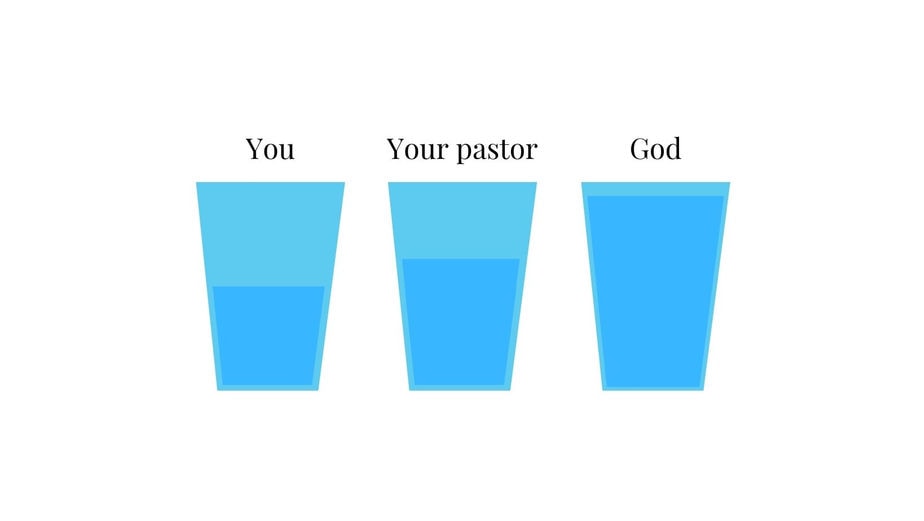
The first example makes the mistake of thinking that God is like us (although better than us). But He is not like us.
These things you have done, and I have been silent; you thought that I was one like yourself. But now I rebuke you and lay the charge before you.
Psalm 50:21, ESV
The mistake above is that it is assumed that God is defined by the exact same categories that define humans. Take note of this wrong way of thinking about God:
As humans we experience love. The Bible teaches in many places that God loves His people (1 John 4:8). Hence, God loves as humans do - but He probably has the capacity to love them more than we can love other people.
The problem with the above view of God is that it thinks of "love" as something that stands over and above God and man together (the glass that contains both God and man) and defines God and man both as an independent abstract category. This view makes the difference between God's love and our love a merely quantitative difference (i.e. God has the capacity to love more than we do) as defined by the independent idea of love.
But, the difference between God and us is not merely a quantitative difference, but a qualitative difference. God's love is like and unlike our love. Unlike our love as love, being an attribute of God as revealed in Scripture, does not stand over and above Him as an abstract category that defines Him. God is love. He is the standard for love. He is the original. And like our love, because as God's created analogues, we reflect on a finite/analogous level that which finds its originality in God. Our love, then, is analogous to God's love. A finite reflection of the perfect love that exists in His being.
What we've just described is God's self-contained nature. To deny that God is self-contained is to restrain Him with categories that derive their definition from a source that is not God.
John Frame writes the following:
God's attributes are not abstract qualities that God happens to exemplify. They are, rather identical to God himself... For example, God's goodness is not a standard above him, to which he conforms. Rather, his goodness is everything he is and does. It is God himself who serves as the standard of goodness for himself and for the world. He is, therefore, his own goodness. But he is also his own being, wisdom, power, holiness, justice, and truth.
John Frame, Divine Aseity and Apologetics
We now turn to the second example...
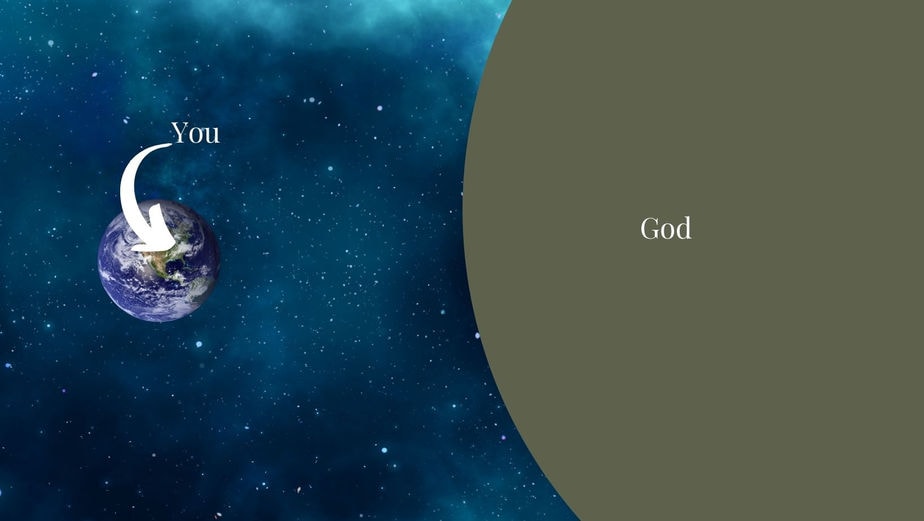
In our second example (very much related to the first), the elementary mistake is made thinking that God exists on the same plane of existence as we do. But to maintain an idea like this is to conflate the Creator with the creature, or to make the Creator contained in something that is created. God is not contained in a context that is greater than us and Him alike. God is self-contained, absolutely distinct from creation. This avoids the pitfalls of thinking of God as a kind of superman, or along the lines of the Greek gods that exist "somewhere out there" in their own impersonal context.
Know that the Lord, he is God! It is he who made us, and we are his; we are his people, and the sheep of his pasture.
Psalm 100:3, ESV
The God who made the world and everything in it, being Lord of heaven and earth, does not live in temples made by man.
Acts 17:24, ESV
When we think of God, we must fiercely maintain that God is distinct from Creation and in no way dependent on anything that is not God (created), hence, God is self-sufficient and self-contained. In the beginning, there was God. God was not contained in an impersonal context greater than Him. He was not defined by abstract ideas that stand over and above Him. After creation, this did not change. God did not become dependent on His creation in any way. Hence, we must maintain the Biblical picture of God's existence as famously drawn by Cornelius Van Til.
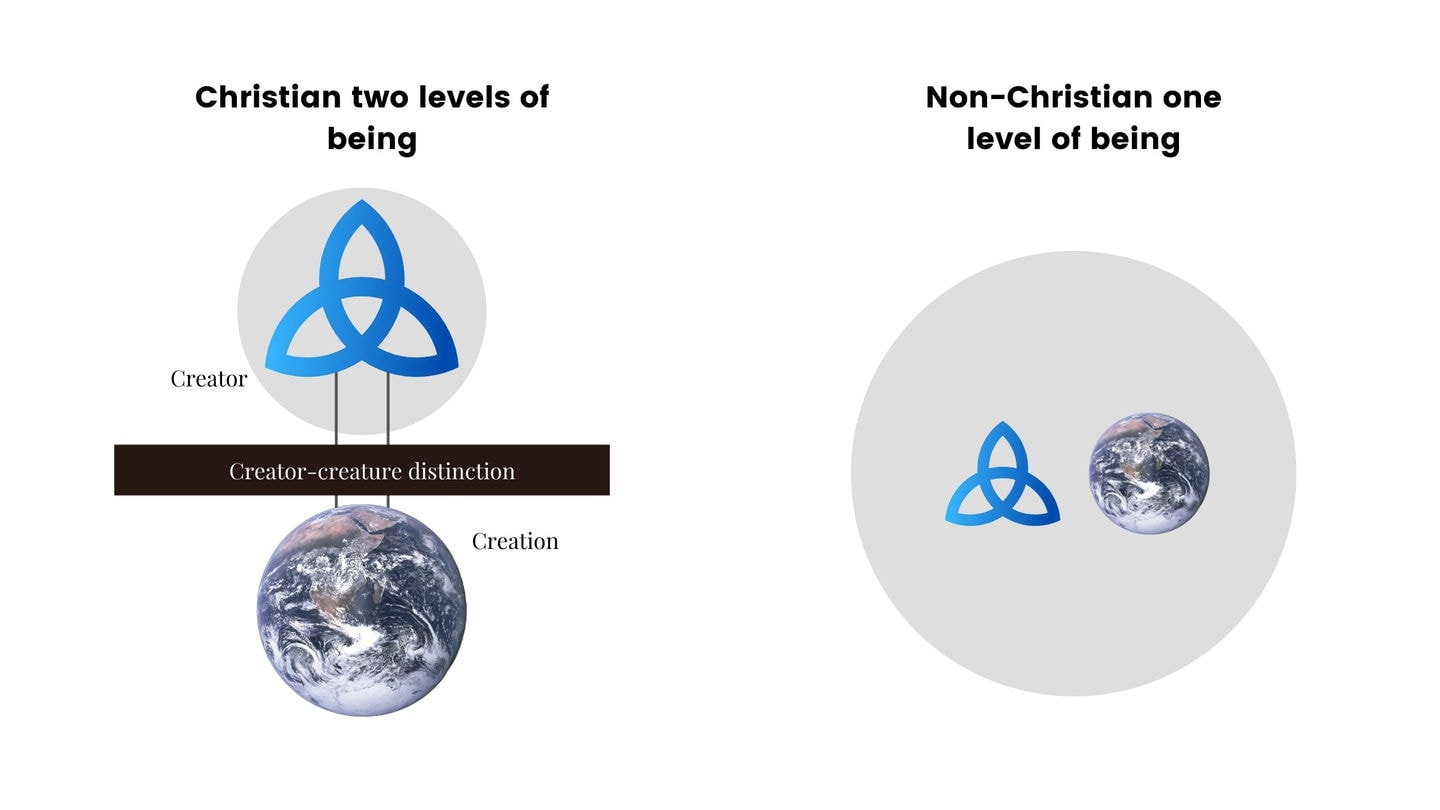
Known for his complex way of writing, one of Van Til’s simpler approaches in the classroom was when it came to this topic. He simply drew two circles, one suspended above the other. The top circle is God, the bottom representing man. Two vertical lines from one to the other indicated relation between God and man. In this way, Van Til formulated that as God’s image-bearer, man indeed has a creaturely and analogical similarity to God in his being and knowledge, but their identities are denied at every point. While in some analogical sense similar, God and man are as different as two things could ever be [3].
After reflecting on the above for a while, it should become clear how God is greater than us in ways that we cannot even start to comprehend.
Behold, these are but the outskirts of his ways, and how small a whisper do we hear of him! But the thunder of his power who can understand?
Job 26:14, ESV
This is why the Reformed Churches in South Africa that holds to the Belgic Confession, confesses with Article 1 the following:
We all believe in our hearts and confess with our mouths that there is a single and simple spiritual being, whom we call God— eternal, incomprehensible, invisible, unchangeable, infinite, almighty; completely wise, just, and good, and the overflowing source of all good.
Belgic Confession, Article 1
Note the use of the words "simple", to indicate His self-contained nature. "Incomprehensible" to indicate the Creator-creature distinction, and "Overflowing source of all good" to again indicate that "goodness" is not an abstract category that contains God - but that goodness finds its origin in God.
What is the doctrine of the Trinity?
When we grasped the above view of God, it might spark a few questions in our minds. How can God be love given that there was no one to love before creation? If God is radically different from Creation, how can we say true things about God, given that human words are themselves created things?
Before we answer this, we need to discuss the doctrine of the Trinity. The one God we speak of above is the Trinity (the Triune God of the Bible).
The doctrine of the Trinity means that there is one God who eternally exists as three distinct Persons - the Father, Son, and Holy Spirit. Stated differently, God is one in essence and three in person. These definitions express three crucial truths: (1) the Father, Son, and Holy Spirit are distinct Persons, (2) each Person is fully God, (3) there is only one God [2].
The fact that God is a Trinity is emphasised by B.B. Warfield, commenting on the work of John Calvin as follows.
The tripersonality of God is conceived by Calvin, therefore, not as something added to the complete idea of God, or as something into which God develops in the process of His existing, but as something which enters into the very idea of God, without which He cannot be conceived in the truth of His being.
Warfield, Calvin's Doctrine of the Trinity
Indeed, Calvin writes that "if we do not hold to these [the three Persons in the divine unity], we have nothing but a naked and empty name of God, by no means the true God, floating in our brain." [4]
If God as Triune does not form part of your conception of God, what you believe God to be, is not as He truly is.
One essence and three persons
The Westminster Confession of Faith 2.3 says the following regarding the Trinity:
In the unity of the Godhead there be three Persons, of one substance, power, and eternity; God the Father, God the Son, and God the Holy Ghost. The Father is of none, neither begotten nor proceeding; the Son is eternally begotten of the Father; the Holy Ghost eternally proceeding from the Father and the Son.
From this section, we know that the Father, the Son and the Holy Spirit are equally the one God. Since they are of one substance (essence), it means that the divine essence and all its perfections and prerogatives (or privileges) belong to each of the persons in the same sense and in the same degree. All three persons are co-equal [5].
Also, the titles Father, Son and Holy Spirit are not different names of the same person. They are distinct persons. The Father is not the Son, the Son is not the Holy Spirit, and the Father is not the Holy Spirit. They are different, distinct persons [6]. The persons are distinguished from one another via certain personal properties (the Father by paternity, the Son by filiation, and the Spirit via spiration), and they are revealed in a certain order in Scripture [7].
Also, the Son is not God alone, the Father is not God alone, the Holy Spirit is not God alone. The Father, the Son, and the Holy Spirit are each fully God, while simultaneously existing together as fully God. We cannot remove one of the persons from the Trinity.
Now, whenever someone reads this, you would almost think them justified to cry foul. How can the Father, the Son and the Holy Spirit all be the same God? Doesn't logic demand that names of the persons be seen as mere titles to a singular person (e.g. as "commander", "chief", the "president" all equally applies to the same person, e.g. Cyril Ramaphosa or Joe Biden)? The answer is yes, but that is only if we regard ourselves as the measure of all things. Logic itself is not an abstract category that stands above God and man. Remember, God is self-contained. Once we realize that our concepts are finite, we can humbly approach God's self-revelation in the Bible with the sure knowledge that what he reveals to us is true, and will expand our existing knowledge and not undermine it [8].
Perichoresis
Perichoresis refers to the mutual intersecting or “interpenetration” of the three Persons of the Godhead and may help clarify the concept of the Trinity. It is a term that expresses intimacy and reciprocity among the Persons of the Godhead. A synonym for perichoresis is circumincession [9].
In Scripture, we find numerous references where Jesus refers to the indwelling of Him in the Father and vice versa. This mutual indwelling of the divine persons is what is referred to as perichoresis [1o].
Do you not believe that I am in the Father and the Father is in me? The words that I say to you I do not speak on my own authority, but the Father who dwells in me does his works. Believe me that I am in the Father and the Father is in me, or else believe on account of the works themselves.
John 14:10-11, ESV
At the risk of putting things in physical terms, perichoresis means that “all three persons occupy the same divine ‘space.'” [11] In other words, we cannot see God without seeing all three persons at the same time [12]. The three persons coinhere in such a way that the persons are always and forever with and in one another, yet without merging, blending, or confusion. Only by affirming the mutual indwelling of each other, can we worship our Triune God as truly three and truly one [13].
The reason it is important to grasp something of the divine perichoresis is that it protects us from a few errors when we think of the Trinity. One is called Arianism, another is called Sabellianism, and another is called Tri-theism. Arianism believes God the Father to be God alone, whilst the Spirit and the Son are lesser gods. Sabellianism (modalism) believes that God is one person that exists in different modes at different points in time (i.e. Father, Son and Spirit - but never all at once). Tri-theism believes that the Father, the Son and the Spirit are three separate gods that simply participate in an impersonal common divine essence (like different humans participate in human nature).
Since we have three co-equal persons who equally possess the divine essence, we steer clear of Arianism. Since all three persons are co-eternal, we steer clear of Sabellianism. And since all three persons co-inhere so as to exist in an inseparable manner with a single will and consciousness [14], we steer clear of Tri-theism.
Personal, self-contained relationships between the persons
From divine perichoresis, we can see that the Father and the Son are related to one another within the personal context of the Holy Spirit, the Father and the Holy Spirit are related to each other within the personal context of the Son, and the Son and the Holy Spirit are related within the personal context of the Father.
This is because, for example, the Father contains both the Son and the Spirit. Moreover, by containing the Son, the Father comprehends His own relationship to the Spirit, and by containing the Spirit, the Father comprehends His own relationship to the Son (and the same applied for the other combinations of persons).
An insight that follows from the above is that it is only a Triune God that can be self-contained, independent. If we for the sake of the argument think of a "binity", the relationship between the two persons must be facilitated by an impersonal context that contains both persons, resulting in this god no longer being self-contained. The same conclusion follows if we increase the number of persons beyond three [15].
God is love
Armed with a basic Trinitarian understanding of God, we can now proceed to answer the first of our two questions. If God is love, and there was no one other than God before creation, how can God be love without it resulting in love becoming an empty concept?
The simple answer is that although God was alone and self-sufficient, He never existed as a singular person. The one God always existed as the Father, the Son and the Holy Spirit. Within the dynamic of the three persons, we find intra-Trinitarian love. Generally, intra-Trinitarian love is the love that God the Father has for both God the Son and God the Holy Spirit. It is also the love that God the Son has for the Father and the Spirit, and the love that the Spirit has for the Father and Son. Love then is that which is expressed perfectly within the persons of the Trinity in their relationship towards each other.
We can truly know God (the Creator-creature relation)
The second issue touches on the Creator-creature relation. Given that God is incomprehensible, how can we say true things about God, to begin with? And if we can say true things about God, does that not place God within a context that encapsulates both God and man so as to allow our words to make contact with God by referring to something that contains them both?
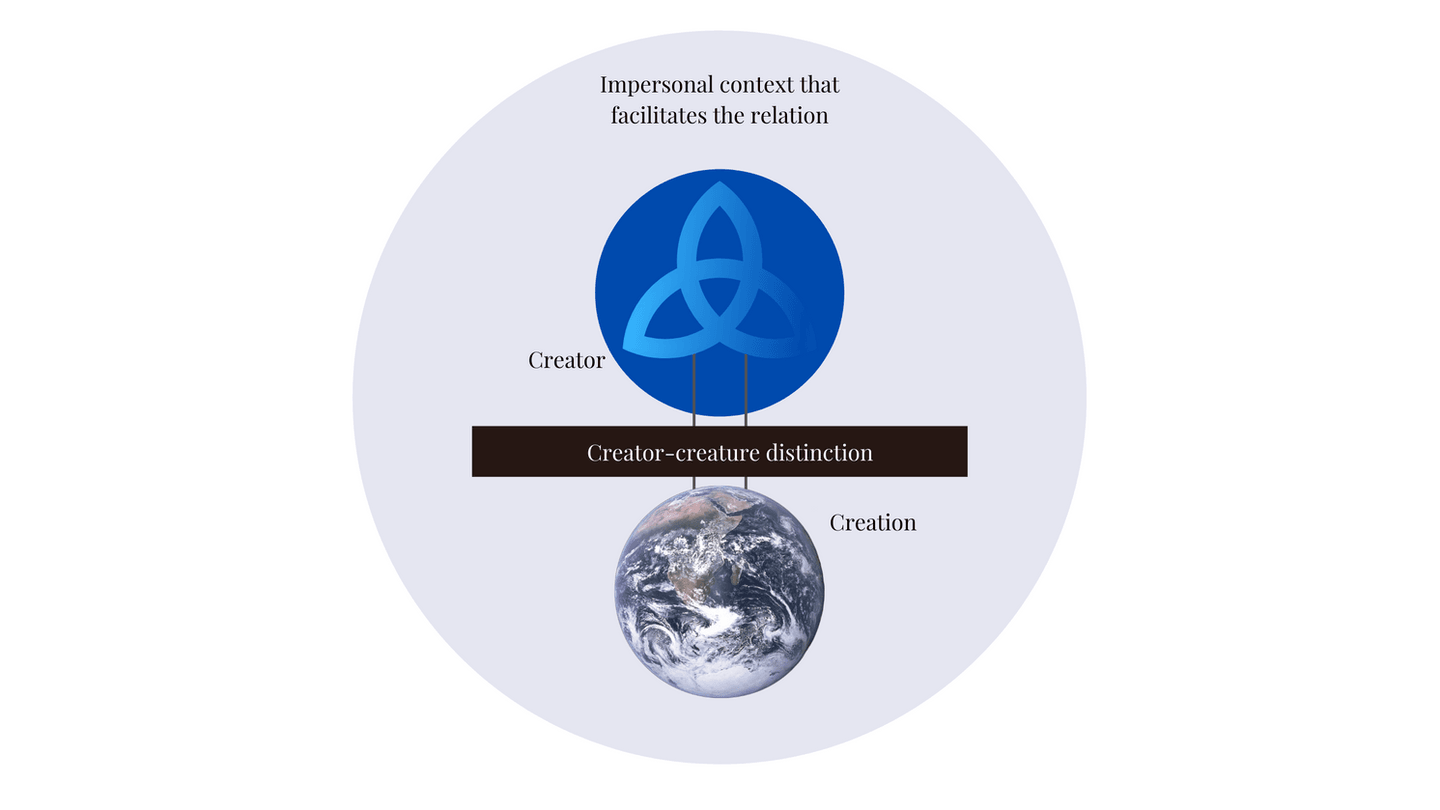
As Christians, we know that God is distinct from Creation (so we cannot be equated with pantheists who imply that the Creator is identical with the creature). And since we claim to be able to know God, where does this relationship exist? How do we escape the problem of the impersonal context (e.g. space, time, laws of logic, being in general) that seems to reign supreme over both God and man? However we go about thinking of this, the Creator-creature distinction must be kept intact in the Creator-creature relation. We cannot elevate man to the level of God, nor can we bring God down to the level of creature (as we see some modern theologians tend to do) [16]. This is where can start to see the importance of the doctrine of the Trinity. For Christians, it's not what facilitates the relationship between God and man, but Who. God the Son has been facilitating the relationship between God the Father and creation from the beginning [17]. The Son has been operating in divine condescension with the task (as determined in eternity past in the Trinity) to reveal the Father to mankind and to creatures. The Son Himself, especially after the incarnation (when the Son took on human nature in addition to His divine nature in the great mystery of the hypostatic union), is the point of contact/context/doorway between God and man that can facilitate the relationship between the two. Hence, God Himself is not reliant on any impersonal context to have a relationship with mankind.
Think about this for a while, and then read John 1. Especially John 1:18.
In the beginning was the Word, and the Word was with God, and the Word was God. He was in the beginning with God. All things were made through him, and without him was not any thing made that was made...
...The true light, which gives light to everyone, was coming into the world. He was in the world, and the world was made through him, yet the world did not know him...
...No one has ever seen God; the only God, who is at the Father's side, he has made him known.
John 1:1-3, 9-10, 18, ESV
According to John 1:18, all knowledge of God has been mediated through God the Son.
Herman Bavinck in his Reformed Dogmatics, Volume II, God and Creation writes that the Son is personal wisdom by whom everything is created. Everything rests and coheres in Him (Col 1:17), and is created for Him (Col 1:16), not as its final goal but as the head and master of all creatures (Eph. 1:10) [18].
In addition, Bavinck writes that the names by which we call and address God are not arbitrary (which some might think given that there is no third thing by which we can identify both God and creation that encapsulates them both), as they have not been conceived by our own pleasure. It is God who deliberately and freely, both in nature and Scripture, reveals Himself and who gives us the right to name Him based on this self-revelation. These words, however, remain human words, and hence they are accommodated language (or anthropomorphic language). [19]
A few examples would suffice:
There is mention of God's face (Exodus 33:20); eyes (Psalm 11:4); nose (Deut 33:10), mouth (Deut 8:3). Surely these descriptions don't literally mean that God has these features, as then God would have a body suspended in space, yet we know God is spirit (John 4:21)!
What spells out God's grace is that since creation, God has stooped down to His creatures, and appearing to them in human fashion revealing Himself in human language. [20]
And who better to make God known than the Son of God, who since all eternity is the exact imprint of the divine nature (Hebrews 1:3)? God the Son has been accurately representing the Father since all eternity. Moreover, we know that the Father created through the Son. We can therefore know that our finite words truly make contact and accurately describe the Father not because they describe a third thing that encapsulates God and man, but because we accept this on the authority of the Son.
The following was beautifully described in a sermon by Ps. Brant Bosserman on the 4th of October 2021. The sermon is linked below.
He describes the solution in more technical terms in his book,The Trinity and Vindication of Christian Paradox, but summarises it as follows in:
The solution to this alleged dilemma may appear overly simple: Man knows that created analogues reveal their absolute Creator truly because God utilizes them in His own self-disclosure, and confirms their capacity to reveal Him (John 1:14; 14:6).
Brant Bosserman, The Trinity and the Vindication of Christian Paradox
Conclusion
The aforementioned topic is a huge topic, and it can never be captured in a single article such as this one. But my hope is that it did spark some thoughts in your mind, and that it would drive you to better get to know your God in His revealed Word, the Bible.
Once we have a correct view of God, creation and man it equips us in a unique fashion to offer critiques against non-Christian worldviews with objective force. If the Triune God of Scripture does not exist, impersonalism (or pure chance) reigns supreme and it effectively destroys all knowledge by tumbling people into ultimate scepticism.
More resources
Reformed Dogmatics, Volume II, God and Creation, Herman Bavinck
Van Til and the Creator-creature relation , Camden Bucey
The Doctrine of the Trinity and Apologetics, Brant Bosserman
The function of perichoresis and the divine incomprehensibility, Lane Tipton
References
[1] Tipton, L. A Trinitarian Foundation for General and Special Revelation.
[2] Desiring God. 2021. What Is the Doctrine of the Trinity? | Desiring God . [ONLINE] Available at: https://www.desiringgod.org/articles/what-is-the-doctrine-of-the-trinity. [Accessed 11 October 2021].
[3] The Confessional Outhouse. 2021. The Creator-creature Distinction: Mind Your Circles | The Confessional Outhouse. [ONLINE] Available at: https://confessionalouthouse.wordpress.com/2008/06/30/the-creator-creature-distinction-mind-your-circles/. [Accessed 12 October 2021].
[4] John Calvin, Institutes, 1.13.2.
[5] Van Til, C., 2007. An Introduction to Systematic Theology. P&R Pub. P.g. 315
[6] Van Til, C., 2007. An Introduction to Systematic Theology. P&R Pub. P.g. 316
[7] Van Til, C., 2007. An Introduction to Systematic Theology. P&R Pub. P.g. 316
[8] Bosserman, B., 2014. The Trinity and the Vindication of Christian Paradox. Wipf and Stock Publishers.
[9] GotQuestions.org. 2021. What is perichoresis? | GotQuestions.org. [ONLINE] Available at: https://www.gotquestions.org/perichoresis.html. [Accessed 12 October 2021].
[10] The Gospel Coalition. 2021. Theological Primer: Perichoresis. [ONLINE] Available at: https://www.thegospelcoalition.org/blogs/kevin-deyoung/theological-primer-perichoresis/. [Accessed 12 October 2021].
[11] Ibid.
[12] Ibid.
[13] Ibid.
[14] Tipton, L. The function of perichoresis and the divine incomprehensibility
[15] Bosserman, B., 2014. The Trinity and the Vindication of Christian Paradox. Wipf and Stock Publishers. pg. 178
[16] Reformed Forum. 2021. Van Til and the Creator-Creature Relation – Reformed Forum. [ONLINE] Available at: https://reformedforum.org/van-til-and-the-creator-creature-relation/. [Accessed 16 October 2021].
[17] YouTube. 2021. Brant Bosserman - The Doctrine of the Trinity - YouTube. [ONLINE] Available at: https://www.youtube.com/watch?v=_mnHbj66gDQ. [Accessed 14 October 2021].
[18] Bavinck, H., Bolt, J. and Vriend, J., 2004. Reformed Dogmatics. Baker Academic. pg. 423
[19] Bavinck, H., Bolt, J. and Vriend, J., 2004. Reformed Dogmatics. Baker Academic. pg. 99
[20] Bavinck, H., Bolt, J. and Vriend, J., 2004. Reformed Dogmatics. Baker Academic. pg. 100
Discussion